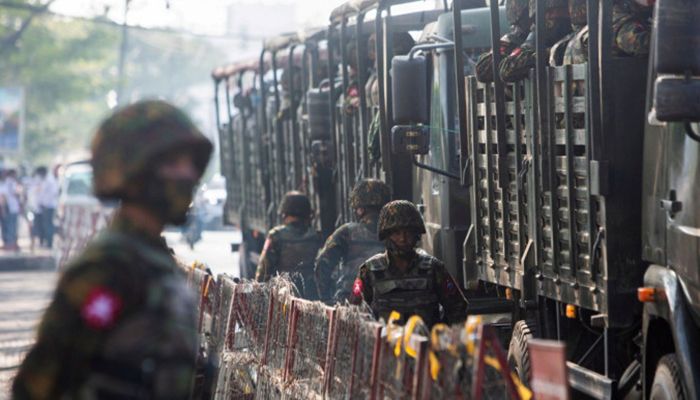
International Desk
Publish: 01 Aug 2023, 11:28 am

Photo: Collected
State-run media reported on Monday that the military-run government in Myanmar has prolonged the state of emergency it declared when it overthrew an elected government two and a half years ago, further delaying the elections it had vowed to hold at the time.
According to MRTV television, the National Defense and Security Council convened on Monday in the capital, Naypyitaw, and decided to prolong the state of emergency for a another six months beginning on Tuesday to allow for election preparations. Although the NDSC is technically a constitutional government entity, the military really controls it.
The announcement amounted to an admission that the army, despite having a significant advantage in manpower and equipment, does not exert enough control to conduct elections and has failed to quell widespread opposition to military rule, which includes increasingly difficult armed resistance as well as nonviolent protests and civil disobedience.
On February 1, 2021, when military detained Aung San Suu Kyi, senior members of her cabinet, and supporters of her National League for Democracy party, the state of emergency was proclaimed. After Myanmar had been governed by the military for fifty years, the coup d'état undid years of progress toward democracy.
In the most recent general election, which Suu Kyi's party won by a wide margin while the military-backed Union Solidarity and Development party fared badly, the military claimed it had been the victim of fraud. Independent election monitors said that they did not discover any significant anomalies.
Widespread nonviolent protests against the army takeover were put down by security forces using fatal force, sparking armed resistance that U.N. experts have referred to as a civil war.
As of Monday, the independent Assistance Association for Political Prisoners has recorded 3,857 deaths by the security forces since the takeover.
The time limit for military rule under the 2008 constitution, which was adopted by the military, was one year, with two additional six-month extensions conceivable if preparations for fresh elections had not yet been finished. Accordingly, the time restriction ended on January 31, 2018.
However, citing the continued abnormality of the situation in the nation, the NDSC permitted the military administration to prolong emergency rule for an additional six months in February. The fourth extension was announced on Monday.
A state of emergency enables the military to take over all governmental duties, giving Senior Gen. Min Aung Hlaing, leader of the ruling military council, control over the legislative, judicial, and executive branches of government.
Nay Phone Latt, a spokesperson for the National Unity Government, an underground group that calls itself the country's legitimate government and serves as an opposition umbrella group, said the extension of emergency rule was expected because the military government hasn't been able to annihilate the pro-democracy forces.
"The junta extended the state of emergency because the generals have a lust for power and don't want to lose it. As for the revolutionary groups, we will continue to try to speed up our current revolutionary activities," Nay Phone Latt said in a message Monday.
The military government labels the NUG and its armed wing, the People's Defense Forces, as "terrorists."
Monday's report did not specify when the polls might be held, saying only that they would occur after the goals of the state of emergency are accomplished.
According to the constitution, the military must transfer government functions to the president, who heads the NDSC, six months before the polls. That would mean Acting President Myint Swe, a retired general.
The military originally announced that new polls would be held a year after its takeover and later said they would take place in August 2023. But the extension of the emergency in February made that timing impossible.
The MRTV report said Myint Swe told members of the NDSC that the government needs to do more to achieve stability and the rule of law to prepare for the election.
Critics say the polls will be neither free nor fair under the military-controlled government, which has shut independent media and arrested most of the leaders of Suu Kyi's party.
Her party was disbanded by the electoral commission in March along with 39 other parties for failing to reapply in accordance with a political party registration regulation that the military administration imposed early this year. The legislation makes it challenging for opposition parties to mount a strong challenge to candidates supported by the army.
Suu Kyi, 78, is currently serving a 33-year jail term after being found guilty in a number of politically charged charges, the most of which were filed by the military regime.
Subscribe Shampratik Deshkal Youtube Channel
Topic : South Asia Myanmar Election State Emergency
© 2024 Shampratik Deshkal All Rights Reserved. Design & Developed By Root Soft Bangladesh